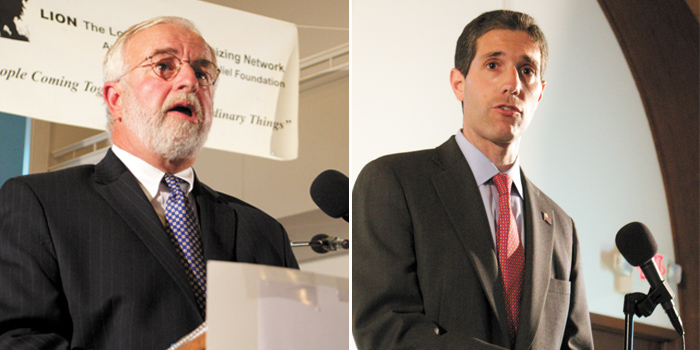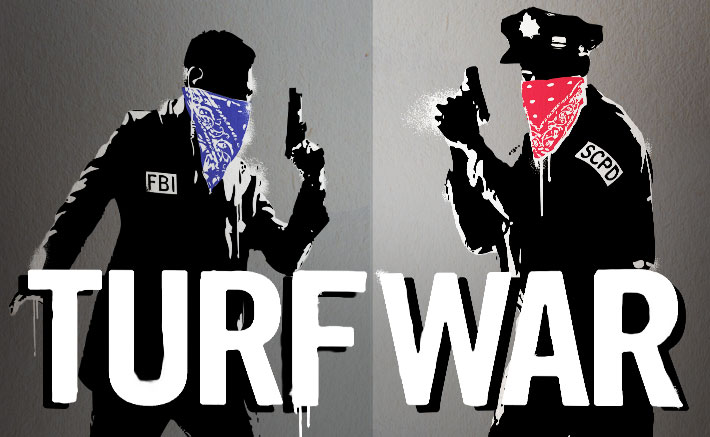Some called for stronger hate crimes laws, others criticized Suffolk police, a few offered opinions on why Long Island’s Hispanics are victimized and a handful spoke about things that had nothing to do with the topic at hand, but while concluding the last of four Suffolk County Hate Crimes Task Force public hearings this week, the organizers pleaded for patience while they process it all.

The area surrounding the Patchogue train station has seen three high-profile bias crime investigations in the past year.
The crowd of about 50 left the convention center at the Brentwood campus of Suffolk County Community College as task force members contemplated why no new victims had come forward. While the door has been left open for additional public hearings, one hot topic that resurfaced from a previous meeting concerned claims made that Suffolk’s lead hate crimes investigator mishandled a complaint. But that controversy was just a footnote at the Oct. 6 meeting, which came one day after news broke that Suffolk police are also in the spotlight of a federal investigation into their handling of hate crimes.
“We ask that you believe us when we say that we’re here to help you,” said Suffolk Legis. DuWayne Gregory (D-Amityville), the chairman of the task force that he formed to examine the hate crimes issue in the county. “I understand that some people have some problems with outside activities, but I ask you, I plead with you to wait for the final report,” he added, referring to a tangential controversy involving one of the task force’s 13 members.
Task force member Alex Gutierrez, who is also the chairman of the Suffolk County Hispanic Advisory Board, was said to have been embroiled in an altercation with one of the only people who declared at the meetings that he was a hate crime victim: Patchogue resident Hernando Fernandez.
Fernandez alleged that Detective Sgt. Robert Reecks, commanding officer of the Hate Crimes Unit, failed to follow up on his claims that Suffolk police declined to investigate his report. Reecks later testified before the Suffolk County Legislature that “Hernandez is lying” about having met him. New York State Gov. David Paterson had asked the attorney general’s office to look into the matter. A spokesman could not confirm if an investigation had been opened as of press time.
In the meantime, the task force’s findings will be compiled into a report to be written by the Suffolk County Criminal Justice Coordinating Council, which is made up of members of various town and county law enforcement officials. It is slated to be published in February, at around the time the trial is expected to begin against seven teenagers who pleaded not guilty to hate crimes and other charges in the death of Ecuadorean immigrant Marcelo Lucero, who was killed on Nov. 8, 2008, in Patchogue.
Authorities have said the teens told them that targeting and assaulting Hispanics was a regular activity. The teens are also charged in attacks going back nearly a year.
Their alleged hate crimes were the motivation behind the task force being formed and for the federal complaint filed against Suffolk police by LatinoJustice, a Manhattan-based national advocacy group. A spokesman for the U.S. Justice Department’s Civil Rights Division confirmed Oct. 5 that the agency was conducting a joint investigation along with the U.S. attorney’s office.
“We think this is the right step for them to take,” said Foster Maer, an attorney for LatinoJustice. The federal investigation will run concurrent with the agencies’ ongoing review of alleged racially motivated assaults against Latinos on eastern Long Island.
Suffolk police officials were informed of the investigation Sept. 30, a spokesman said. The department’s policies and procedures “show that we respond properly to hate crimes,” Suffolk County Police Commissioner Richard Dormer said in a statement.
“I welcome [the investigation] because it will dispel a lot of the rhetoric that we are not doing our job,” Reecks said following the last task force meeting. He acknowledged that “there is a built-in fear of the police department,” meaning potential victims who are scared might come forward later.
Since Lucero’s killing, Suffolk police have said they are more attentive to bias crimes. Police officials also insist they do not ask victims about their immigration status, a past policy that has been cited as a reason why Hispanics don’t report hate crimes.
Although not an immigrant, Gregory has been there himself. As a boy, he was a victim of a hate crime that he never reported when a known racist in his neighborhood, while using a racial slur, sicced his dog on him. Gregory was bitten.
“I feel strongly that there are other potential victims out there,” he said.
With Associated Press






